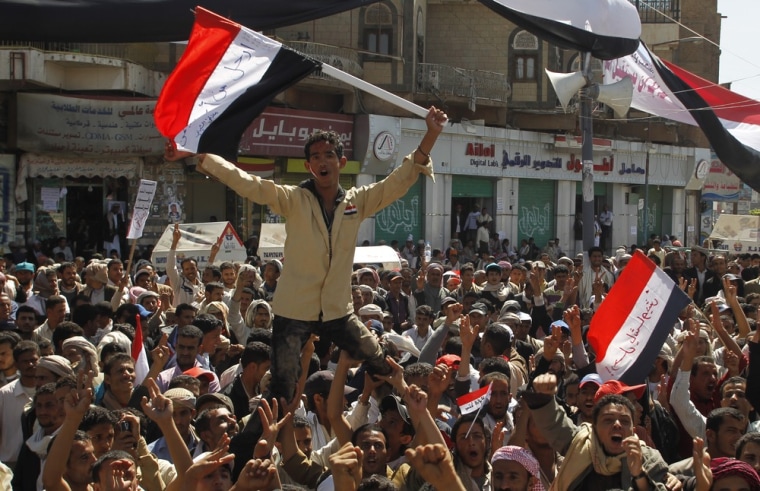Yemen's main opposition coalition on Wednesday presented embattled President Ali Abdullah Saleh with a road map for a smooth transition of power, and government sources told Time magazine that an initial agreement was reached for Saleh to step down within nine months.
"The leadership has reached an initial agreement ... an official statement is due tomorrow," Time quoted one source as saying. Another government official said that "details are being worked out."
The opposition did not confirm an agreement. Earlier, opposition spokesman Mohammed al-Sabry said that "what was presented (to a representative of Saleh) was a road map for departure within a time frame of a month or two, or six months."
"As for the people's demand for the departure of the regime, there is no going back on that," he added.
The rotating opposition chairman, Mohamed al-Mutawakil, said the coalition was also asking for trials of those responsible for a harsh crackdown on protests in which 24 people were killed in two weeks, most in the south.
Disturbances continued there on Wednesday as police and armed squatters clashed. Two people were killed.
In Sanaa on Wednesday, young activists who have taken the lead in ever-swelling street protests demanded immediate change in the Arabian Peninsula state.
"Get out! Get out! Get out!" protesters chanted near Sanaa University, where once-small student-led protests have grown into daily rallies of 10,000 or more. "No negotiation and no dialogue until the regime leaves."
Elsewhere, 30 people were wounded as Saleh loyalists clashed with several thousand protesters in the Red Sea town of Hudeidah, southeast of the capital Sanaa.
The opposition, which just two days ago had said it would not retreat from demands that Saleh leave power immediately, agreed with religious and tribal leaders to ask him to take steps toward a transition.
These included changing the constitution and rewriting election laws to ensure fair representation in parliament, open up voter registration and make politics more democratic overall.
The opposition also wants the removal of Saleh's relatives from leadership positions in the army and security forces, and a guaranteed right to peaceful protest.
Yemen, already plagued by regional separatism and al-Qaida insurgents, has become one of the Arab nations most shaken by popular unrest sweeping across North Africa and the Middle East.
Saleh, a key ally of Washington's against al-Qaida's resurgent Yemen-based arm, has vowed to step aside when his term ends in 2013 and avoid transferring power to his son.
He has had trouble persuading opponents this would be anything more than a maneuver to ward off a spillover of unrest already raging in Libya, Bahrain and Oman, galvanized by successful uprisings in Egypt and Tunisia.
Protesters on the streets — 10,000 each in Sanaa and the industrial cities of Taiz and Ibb — showed little readiness to allow a more measured transition, complicating efforts to give Saleh a respectable way out.
Political analysts say it remains unclear who really has the upper hand in Yemen, where tribal allegiances are strong. Young people have given street protests their momentum but the opposition is able to draw bigger crowds.
The cash-strapped government appointed a judge on Wednesday to look into corruption issues and a meeting was planned for Saturday to discuss an initiative to provide 60,000 jobs to young college graduates. Unemployment and graft have been among protesters' main complaints.
In the south, once an independent state, a secessionist undercurrent pervades protests despite efforts to find a united national opposition voice.
With the protests swelling gradually, Saleh has seen a series of allies defect, including a leading hardline Muslim cleric, Sheikh Abdul-Majid al-Zindani, who only two weeks ago backed the president staying on until 2013.
"We'll be here until the regime departs and we have no other demand," said Ali Naji, a protester in Sanaa.
Samia al-Aghbari, a student leader in Sanaa, said: "The agreement bypasses the youth revolution and is not acceptable. Our demand is one: The departure of the regime."
Where once the protests were the domain of students and activists, they now attract a broader segment of society into the streets that last week began to include children, some wearing headbands emblazoned with the word: "Leave."
